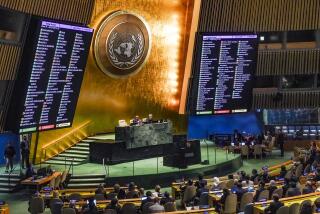U.N. Lets Iraq Buy More Oil Industry Parts
- Share via
UNITED NATIONS — The Security Council decided Friday to let Iraq spend more money to repair its oil industry--an investment intended to boost the amount of food and medicine Baghdad can buy through a U.N. humanitarian relief program.
Iraqi Oil Minister Amir Mohammed Rashid Ubaydi welcomed the decision, which he called a victory for Iraq. “When good insists, . . . evil backs down,” he said, speaking in Baghdad before the vote.
All 15 ambassadors voted in favor of the U.S.-sponsored resolution without comment.
Independent oil industry experts have said Iraq must rehabilitate its pumping stations if it wants to continue exporting crude through the U.N. “oil-for-food” program, which lets Baghdad buy humanitarian goods using proceeds from U.N.-supervised oil sales.
Baghdad’s oil industry--its main source of revenue--was targeted during the Persian Gulf War and has been debilitated by nearly 10 years of sanctions.
The oil-for-food program was started in 1996 to provide for Iraqis suffering under sanctions imposed after Iraq’s 1990 invasion of Kuwait.
In 1998, the Security Council agreed to allow Iraq to use $300 million every six months from oil-for-food proceeds to buy spare parts.
Friday’s resolution increases that amount to $600 million for the six-month phase of the program that began in November, as well as retroactively for the previous six-month period. It says the council would consider renewing the provision in the future.
The resolution also says the council would be willing to consider other ways to improve the oil-for-food program.
British Ambassador Jeremy Greenstock urged Iraq to take advantage of the new spare parts allowance, which he said would enable Baghdad to export more oil and buy more goods to meet the needs of its people.
“This extra revenue and the welcome decision by the government of Iraq to increase its oil production will bring a significant new element of cash into the program,” Greenstock said after the vote.
Iraq used to be limited to selling $5.2 billion worth of oil every six months under the oil-for-food program. But in December, the council agreed to remove any ceiling on oil sales to buy humanitarian supplies. However, experts have said Iraq cannot increase its output by much without major repairs.
After refusing for months, the United States agreed to the measure and sponsored the resolution to deflect criticism of its tough line on Iraq sanctions, which has come under increasing fire at home and abroad.
Deputy U.S. Ambassador James Cunningham introduced the draft on March 24 during an open debate of the council at which most ambassadors and Secretary-General Kofi Annan criticized the U.S. policy.
Primarily, they complained that the United States was paralyzing repairs on the oil industry by placing more than $1 billion in contracts for spare parts and other equipment on “hold” in the U.N. sanctions committee.
More to Read
Sign up for Essential California
The most important California stories and recommendations in your inbox every morning.
You may occasionally receive promotional content from the Los Angeles Times.












